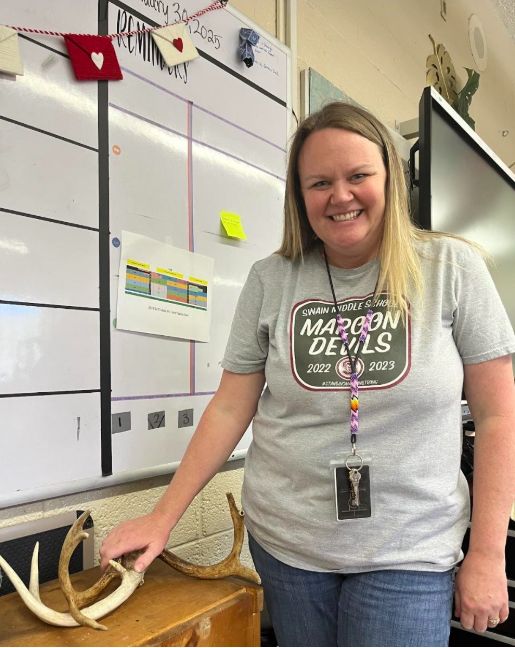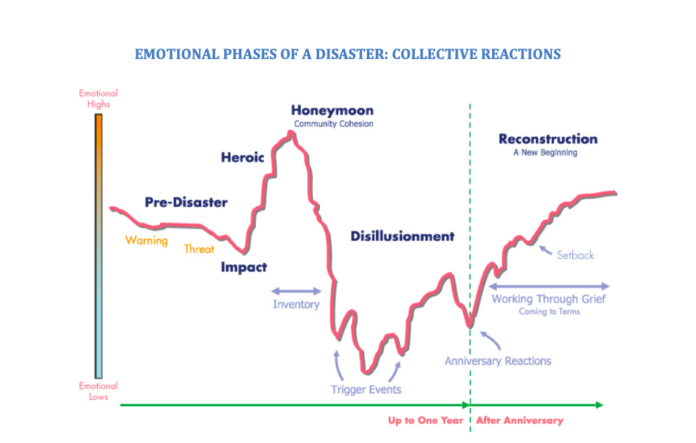“We don’t even have a language for this emotion, in which the wonderful comes wrapped in the terrible, joy in sorrow, courage in fear. We cannot welcome disaster, but we can value the responses, both practical and psychological.” – Rebecca Solnit, A Paradise Built in Hell: The Extraordinary Communities That Arise in Disaster
In sharing about self-care practices, we want to acknowledge that just over six months have passed since Hurricane Helene, a climate-related disaster, struck Western North Carolina. Helene profoundly affected school communities throughout the region, including the schools and teachers mentioned below. Our hearts remain with everyone in WNC as you navigate the emotional phases of a disaster. May you find peace and joy in the giving and receiving of care.
At the North Carolina Center for Resilience and Learning, we recognize and highlight self-care and collective care as key components to cultivating trauma-informed, resilience-focused environments for learning. Through our work with school teams, we sometimes encounter misconceptions about the value of self-care. In educational settings, where student well-being is a primary focus, the needs of educators can sometimes be overlooked and neglected. The misconception that self-care is a luxury rather than a necessity can lead to burnout and stress, which can then lead to unintentional adverse effects on students.
By normalizing self-care through training, sharing among staff, and modeling by school leaders, educators can begin and continue to integrate practical self-care into their daily routines. Doing so will ultimately improve their own well-being, their students’ experiences, and the overall culture and climate of the school.
Normalizing self-care
First, it’s important to understand that self-care doesn’t have to be elaborate, time-consuming, or expensive. For example, allowing quick 60-second breaks throughout the day to pause and/or move around, remembering to drink water, and getting fresh air when possible can all be extremely helpful and can be done with students. Taking a walk right after school responsibilities are completed can be a healthy way to mark the end of the workday.
Second, self-care extends beyond physical health and includes attending to emotional and mental needs and well-being. Educators can benefit from mindfulness practices, journaling, or regularly talking with a trusted colleague. These small moments of reflection and connection can reduce stress and prevent feelings of isolation. Creating boundaries between work and personal life is also critical. Establishing time for personal relationships, hobbies, and relaxation helps teachers recharge and remain connected to their priorities outside the classroom.
School leaders play a crucial role in fostering an environment where educators and staff feel supported to prioritize and practice self-care. Establishing open lines of communication, modeling and encouraging work-life balance, reducing extraneous tasks and responsibilities from the workday, and intentionally cultivating a positive community among the adults can all help build a culture of collective care within schools.
For example, at W.D. Williams Elementary School in Buncombe County, Principal Christy Jones, AP Kristen Frisbee, and School Counselor Kelli Pritchard collaborate to prioritize educator well-being through an established Tap in/Tap out System, the creation of a Staff Wellness Room equipped with snacks, comfortable seating, and soft lighting, and ensuring teachers have time to connect with each other and share celebrations, concerns, and/or questions during monthly staff meetings. The strategies implemented at W.D. Williams highlight that one of the most important ways we can practice self-care is by recognizing when we need support and asking for it.
Examples from teachers
Teachers from a few of our partner schools serve as positive models for the benefits of practicing self-care. They also highlight that self-care is personalized and different for everyone. The more we share our practices with each other, the more we give each other permission to figure out what suits us best.
Meet Lizzy Carver, an 8th grade social studies teacher and Resilience Team member at Swain County Middle School. Lizzy says practical self-care at home is the foundation to being equipped to show up for and with her students the way she wants to each day. For Lizzy, self-care at home involves finding joy and gratitude in daily routines and supportive relationships. Students in Lizzy’s classroom, which feels like a warm, welcoming home, know they belong.

Meet Ashlee Steen, a 2nd grade teacher and Resilience Team member at Blue Ridge School in Jackson County. Ashlee likens self-care to self-love and says it’s necessary not only as a teacher, but as a person existing in the world. She utilizes a wide variety of self-care practices and shares that spending time with her cats is her favorite. Ashlee’s classroom is full of humor, supportive relationships, and hard work.
Meet Sam Marines, a 6th grade ELA and social studies teacher, and Restorative Practices and SEL team leader at Enka Intermediate School in Buncombe County. Sam enjoys yoga as a personal practice for self-care. She shares her passion as a yoga teacher-in-training with her colleagues by regularly offering after-school sessions.
Educators taking care of themselves is not a selfish act, but rather a necessary one. By “necessary,” we don’t mean one more thing added to the already full plates of educators — rather that it’s possible for self-care to become the foundation from which all aspects of teaching, learning, and living grow. When school leaders take actions to prioritize and encourage self-care practices among educators and staff, they are helping educators stay connected to their values and passions, sustaining the work they do with colleagues and students.
Self-care is a vital practice towards fostering collective care in our schools and our communities, preparing us to reach our fullest potential, both individually and together.
You can find more resources here.
